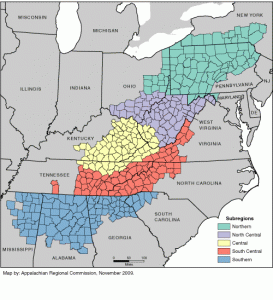By Michael Shrader
On June 4, the Appalachian Regional Commission (ARC) held one of its five 2016-2020 Strategic Plan Listening Sessions in Morehead, Ky., to gather ideas from Appalachian citizens that will inform the commission’s plan for improving economic opportunities in communities across the region.
The Morehead Conference Center was full of forward-thinking minds from Kentucky and surrounding states who explained opportunities and barriers they see in their own communities. Many common themes emerged related to tourism, and adventure tourism in particular. Some attendants cited the need to cultivate and support family farms to create a local and sustainable Appalachian food system. Others spotlighted the opportunity for renewable energy generation in their communities.
The Obama administration’s POWER+ plan was mentioned several times as an opportunity that must be capitalized on. POWER+ invests in Appalachian workers and jobs through unique programs, many of which bear semblance to those discussed in Morehead. Appalachian Voices’ economic diversification campaign is currently building support for this proposal in Southwest Virginia.
Some attendees had a difficult time differentiating between opportunities and barriers to progress in their communities. Where some saw a vast, employable and idle workforce, others saw a lack of educational opportunities and substance abuse posing serious barriers to workforce development. Concrete barriers to development include a lack of local infrastructure such as highways, water systems and, especially, broadband Internet connectivity.
The massive amount of land owned by absentee corporations and extractive industries presents a unique challenge to regional development throughout most of central Appalachia and was mentioned several times throughout the session. Many residents cited less concrete barriers to progress such as a lack of hope and progressive leadership, and the enduring negative stereotypes associated with the region. Finally, there were many who stressed the need for the restoration of the landscape after mining and the resources to create jobs to do so.
Attendees outlined what they saw as ARC’s role in taking advantage of the opportunities and breaking down the barriers for development in their communities. The resounding consensus was a need to access capital and workforce development resources. In addition, attendees felt that ARC needed to work harder to make sure that groups in Appalachia could gain easier access to resources outside of ARC. Some felt that we needed to find ways to craft new language to talk about our problems and solutions. Others cited the need to address to vast health and wellness issues in the region.
Ultimately, many agreed that ARC, as a federal-state partnership, needs to broker change in Washington, D.C., on behalf of Appalachia. One attendee remarked that ARC must facilitate the conversation to look beyond Appalachia to other struggling regions across the nation to solve systemic problems and implement a new ‘true cost’ economic model.
The listening session brought a wide range of individuals and regional stakeholders together to share their unique perspectives. But some still felt that a representative range of people had not been able to participate. In fact, with the all-day session held on a Wednesday, many in attendance argued that it was impossible for the majority of working people to provide input, and stressed need for better stakeholder involvement and opportunities for public involvement.




Please let us know when these meetings should happen in the future!
So many did not know and we’re not given a voice in this matter.